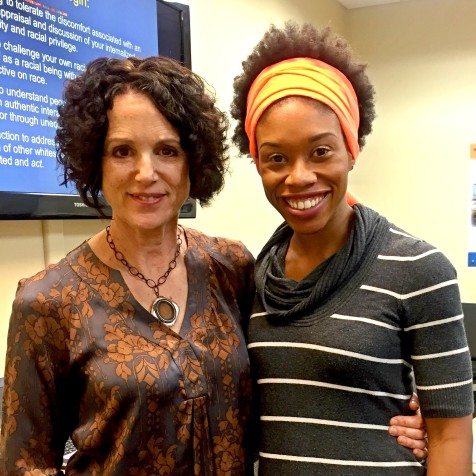https://twitter.com/angieadoptee/status/675064774040928256
The #StayMadAbby hashtag has been one of my favorite hashtag activism moments of the entire year.
The Story behind #StayMadAbby:
In 2008, Abigail Fisher was denied admission to the University of Texas at Austin and decided to sue the school for race discrimination— claiming that as a white student, the university denied her admission because of her race. Only 47 students admitted to University of Texas-Austin that year had lower GPA’s and test scores than Fisher. Of those 47, 42 were White and five were minority students. During the recent affirmative action arguments, Scalia suggested that some black students belong at “slower-track” universities. He implied affirmative action puts minority students in elite universities that are too challenging for them.
How does this pertain to transracial adoption?
I’ve often heard well-intentioned trans-racial adoptive parents speak about how much they love their little bundle of joy, and that they’ve chosen a colorblind approach to parenting. Many view colorblindness as a good thing, elaborating on their desire to take MLK seriously on his call to judge people on the content of their character rather than the color of their skin. They want to focus on commonalities between people, such as their shared humanity, and the fact that they are now a fully intact family-unit. What’s so wrong with that?
How does the Colorblind approach sound to adult transracial adoptees?
Speaking for myself (not all adult transracially adoptees) what I hear is that this parent doesn’t see that bad, ‘colored’ part of me – that black part. If they ignore that part, then I’m a good kid, worthy of love and attention. Even when assuming that these parents are well-intentioned, and want to provide the best possible life for me, it still occurs to me that one of the basic tenets of anti-racism is to understand that although one has not chosen to be socialized into racism, no one is neutral or exempt from it. To not act against racism is to support racism, thus the colorblind philosophy cannot remain. Since true human objectivity is impossible parents must reject the urge to avoid sounding prejudice by making this statement.
Since people of color cannot be racist*, the line of white privilege and oppression can feel especially blurry. From my experience, adoptive parents desperately seek to create environments where their adopted children and their marginalized voices can speak freely and honestly. How can we do this if you’ve chosen to remain staunchly colorblind or pushing back against the truths of how white supremacy continues to reign? The strategy of disregarding race effectively covers up injustice and allows it to continue to permeate many aspects of society.

Robin DiAngelo, a white woman who grew up poor recognizes that her my experience of poverty would have been different had she not been white. The mere fact that this sentence lives in her bio, stuns me. I view her choice to include this tidbit amongst the plethora of other impressive accolades as a way to educate anyone who dare seek out her presence. The reason this sentence spoke to me as, I’ve heard many white people speak about their own experience of marginalization as an effort to obscure and protect racism. Examples of this includes; “…I grew up poor, so I know what it’s like…”, or “I have a black friend…”, or “I grew up in the South, so I know all about that…”
In the words of Robin DiAngelo, “If you are white and have had many experiences, world-wide travels, diversified workplace, speak multiple languages etc., but have not explored your racial identity then you are ignorant and ill-informed.” I am looking forward to collaborating with Robin DiAngelo on anti-racism training’s, specifically designed for trans-racial adoptive parents (stay tuned!).
Next time you bring up the impact of race on Donald Trump, american policing, Daniel Holtzclaw or topics that have seemingly less obvious racial implications (like the Star Spangled Banner and voting rights), and people respond by stating “race has nothing to do with it,” or asks “why do you always bring race into the conversation?” perhaps respond with a simple statement like; “White people are unconsciously invested in racism” or “given our socialization, it is much more likely that we are the ones who don’t fully understand the issue,” or, do as I do and yell “#StayMadAbby” and walk away. I’m just kidding, I don’t yell at people.
**Yes, you read that correct, people of color cannot be racist. Everyone is prejudiced but only members of a dominant group can be racist.

Angela,
How do we find out when and where you will be teaching your anti-racism course?
LikeLike
Hi Brooke,
I’ll likely write a post about this new workshop offering. Aiming for early Spring 2016.
Thanks for asking,
Angela
LikeLike
I am always grateful to get your input on things. Thank you thank you thank you!!! I’m totally in for any trainings you give.
LikeLiked by 1 person
Thank you Angela. Excellent article as always. Last night we were watching “It’s a Wonderful Life” and as I was enjoying the nostalgia, I pointed out how odd it was that there were no non-white students at the high school party and that the only people of color were servants (wait, was that a Black couple in the crowd…). The kids asked why that was, and we talked about it for a few minutes. It’s my opinion that “colorblind” parenting passes over the need to actively counter racism, past and present, leaving it as the default position that our children drink in from society. I’m not very good at this so I’m excited to hear more about the training – very much a needed resource!
LikeLike